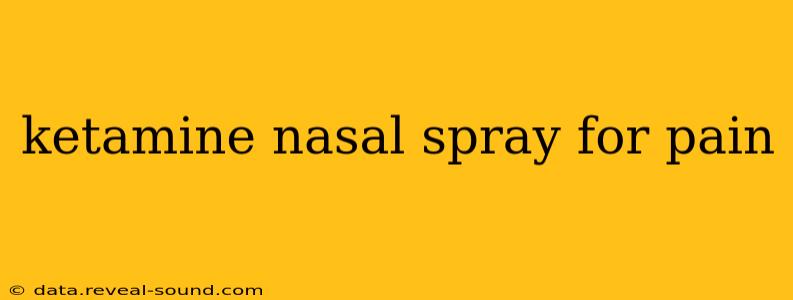Ketamine, once primarily known for its anesthetic and dissociative properties, is emerging as a promising treatment option for various chronic pain conditions. Its administration via nasal spray offers a potentially safer and more convenient alternative to intravenous infusions. This guide explores the use of ketamine nasal spray for pain management, addressing common questions and concerns.
What is Ketamine Nasal Spray Used For?
Ketamine nasal spray is primarily used as an adjunct therapy for treating chronic pain conditions that haven't responded adequately to other treatments. This includes conditions such as:
- Neuropathic pain: Pain caused by nerve damage, often characterized by burning, tingling, or shooting sensations.
- Fibromyalgia: A widespread chronic pain condition affecting muscles and soft tissues.
- Complex Regional Pain Syndrome (CRPS): A chronic pain condition that often develops after an injury or surgery.
- Intractable cancer pain: Pain that is severe and persistent despite the use of other pain medications.
It's crucial to understand that ketamine nasal spray is not a first-line treatment for pain. It's generally used when other methods have proven ineffective.
How Does Ketamine Nasal Spray Work for Pain Relief?
Ketamine's pain-relieving mechanism isn't fully understood, but it's believed to work through several pathways:
- NMDA receptor antagonism: Ketamine blocks the action of NMDA receptors in the brain and spinal cord, which are involved in the processing of pain signals. This blockage helps to reduce the intensity of pain perception.
- Neurogenesis and neuroplasticity: Ketamine may stimulate the growth of new neurons and promote changes in the brain's neural pathways, potentially leading to long-term pain relief.
- Anti-inflammatory effects: Some studies suggest that ketamine may have anti-inflammatory effects, contributing to its pain-relieving properties.
It's important to note that the exact mechanisms and the long-term effects are still being researched.
Is Ketamine Nasal Spray Safe?
Ketamine nasal spray, like any medication, carries potential risks and side effects. These can include:
- Nausea and vomiting: These are common side effects that can often be managed with anti-nausea medication.
- Dizziness and drowsiness: Patients should avoid driving or operating machinery after using ketamine nasal spray.
- Increased blood pressure and heart rate: Individuals with pre-existing cardiovascular conditions should be closely monitored.
- Hallucinations and altered mental states: These side effects are less common but can occur, especially at higher doses. Medical supervision is crucial to mitigate these risks.
- Urinary retention and constipation: These side effects are less frequent but can be a concern for some patients.
The safety and efficacy of ketamine nasal spray depend on proper administration under the guidance of a healthcare professional who can monitor for potential side effects and adjust the dosage as needed.
What are the Potential Side Effects of Ketamine Nasal Spray?
As mentioned above, potential side effects can include nausea, vomiting, dizziness, drowsiness, increased blood pressure and heart rate, hallucinations, urinary retention, and constipation. The severity of these side effects varies depending on the individual and the dosage. It is crucial to discuss any concerns or pre-existing conditions with your doctor before starting ketamine nasal spray treatment.
How Long Does it Take for Ketamine Nasal Spray to Work?
The onset of pain relief with ketamine nasal spray can vary from person to person. Some individuals may experience relief within minutes, while others may see a more gradual reduction in pain over several hours. The duration of pain relief also varies, and repeat doses may be necessary.
What are the Long-Term Effects of Ketamine Nasal Spray?
Research on the long-term effects of ketamine nasal spray for chronic pain is still ongoing. While it can provide significant pain relief in the short term, the long-term efficacy and potential risks are not yet fully established. Close monitoring and regular assessments are necessary to evaluate the long-term benefits and side effects.
Who Should Not Use Ketamine Nasal Spray?
Ketamine nasal spray is not suitable for everyone. Individuals with certain conditions, such as severe heart or liver disease, uncontrolled high blood pressure, or a history of psychosis, should generally avoid using ketamine. Pregnant or breastfeeding women should also avoid using ketamine nasal spray unless explicitly advised by their physician. It's always essential to consult with a healthcare professional to determine if ketamine nasal spray is an appropriate treatment option.
Disclaimer: This information is intended for educational purposes only and should not be considered medical advice. Always consult with a healthcare professional before starting any new treatment, including ketamine nasal spray, to determine its suitability and address any potential risks or interactions with other medications.
